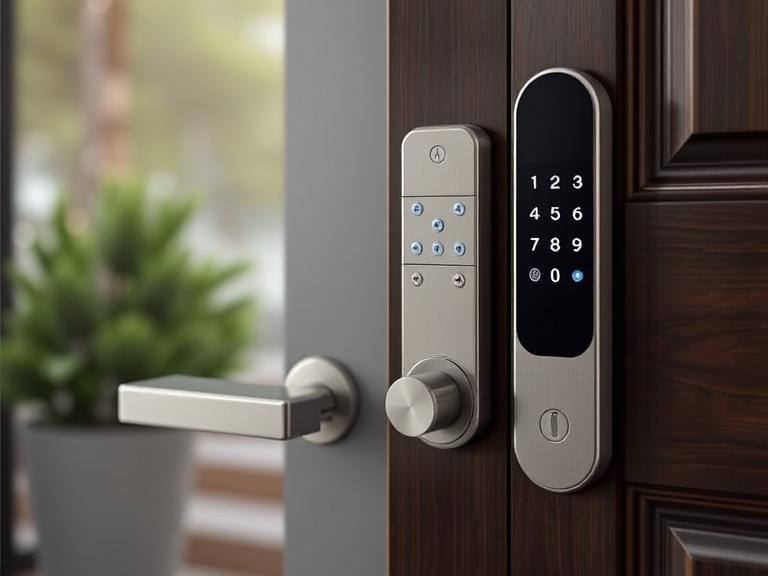Are smart locks really foolproof? This question haunts homeowners and tech enthusiasts alike as smart locks dominate the market, promising convenience and cutting-edge security. While these devices eliminate the need for physical keys and offer remote access, their vulnerability to hacking, technical glitches, and physical tampering raises serious concerns. By 2024, advancements in smart home technology have made these locks smarter—but not invincible. In this deep dive, we’ll expose the hidden risks, debunk industry myths, and reveal whether smart locks truly live up to their “unbreakable” reputation.
Are Smart Locks Really Foolproof? Understanding the Illusion of Perfect Security
Smart locks operate via Wi-Fi, Bluetooth, or Zigbee, allowing users to control access through smartphones, voice commands, or biometrics. Brands like August, Yale, and Schlage advertise military-grade encryption and tamper-proof designs. But beneath the sleek exterior lie critical flaws:
Cyberattacks: Hackers exploit weak encryption, phishing apps, or unsecured home networks to bypass digital locks. A 2023 study by Consumer Reports found that 40% of tested smart locks had vulnerabilities to brute-force attacks.
Physical Vulnerabilities: Traditional lock-picking isn’t dead. Many smart locks lack robust physical mechanisms, making them susceptible to screwdrivers, crowbars, or even magnets.
Tech Glitches: App crashes, dead batteries, or server outages can lock users out of their own homes—or worse, grant intruders unintended access.
The 5 Shocking Ways Smart Locks Fail (Real-World Examples)
Let’s dissect real incidents that prove smart locks aren’t the fortress they claim to be:
1. The “Bluetooth Sniffing” Hack
In 2023, cybersecurity firm Pen Test Partners demonstrated how hackers could intercept Bluetooth signals from popular smart locks like the August Wi-Fi Smart Lock. Using a $50 radio dongle, attackers replicated authentication codes to unlock doors within minutes.
2. The Amazon Delivery Disaster
A Reddit user shared how their Schlage Encode Smart Lock auto-unlocked during an Amazon package delivery, granting the driver accidental access to their home. The issue? A misconfigured geo-fencing feature.
3. Battery Failures = Lockouts
Smart locks rely on batteries, which die unexpectedly. A viral TikTok video showed a family stranded outside their home for hours after their Yale Assure Lock’s battery drained—despite low-battery alerts.
4. Voice Assistant Exploits
Researchers at UC Berkeley tricked Alexa and Google Home into unlocking doors via voice mimicry. By cloning a homeowner’s voice from YouTube clips, they bypassed voice recognition safeguards.
5. Manufacturer Backdoors
Some brands retain “master codes” for troubleshooting, which can be leaked. In 2022, LockState’s database breach exposed 500,000 admin passwords, putting entire neighborhoods at risk.
How to Fortify Your Smart Lock: 6 Expert-Backed Strategies
While no system is 100% foolproof, these steps minimize risks:
- Dual-Layer Authentication: Enable two-factor authentication (2FA) for app logins. Pair your smart lock with a traditional deadbolt for physical redundancy.
- Regular Firmware Updates: Manufacturers patch vulnerabilities through updates. Set your lock to auto-update.
- Secure Your Network: Use a VPN or WPA3 encryption on your Wi-Fi to deter hackers.
- Disable Risky Features: Turn off voice control or auto-unlock if you don’t need them.
- Opt for High-Grade Models: Choose locks certified by ANSI Grade 1 or BHMA for durability and encryption.
Monitor Access Logs: Check your lock’s activity feed weekly for unauthorized entry attempts.
The Future of Smart Locks: Will AI Make Them Hack-Proof?
By 2024, brands will be integrating AI and machine learning to predict threats. For example:
- Behavioral Biometrics: Locks like the Ultion Nexus analyze fingerprints’ blood flow patterns to detect fake replicas.
- Quantum Encryption: Companies like Samsung are experimenting with quantum-resistant algorithms to thwart brute-force attacks.
- Decentralized Networks: Blockchain-based systems (e.g., LockChain) eliminate central servers, reducing breach risks.
Still, experts warn that AI-driven locks could face adversarial attacks—where hackers manipulate data to confuse algorithms.
Are Smart Locks Worth the Risk? A Balanced Verdict
Smart locks excel in convenience but demand cautious adoption. They’re ideal for tech-savvy users willing to invest in high-end models and proactive security practices. However, those prioritizing absolute safety should stick to traditional locks or hybrid systems.
FAQ: Are Smart Locks Really Foolproof?
- Can smart locks be hacked remotely?
Yes, via unsecured networks or phishing scams. Always use 2FA. - Do smart locks work during power outages?
Most have battery backups, but mechanical overrides (like keys) are safer. - Are fingerprint smart locks safer?
Biometrics reduce key theft risks but can be spoofed with advanced replicas.
Conclusion
So, are smart locks really foolproof? The answer is a resounding no—but they’re evolving. By understanding their weaknesses and adopting multi-layered security, you can enjoy modern convenience without becoming a cautionary tale. Stay informed, stay skeptical, and never let tech marketing override common sense.

